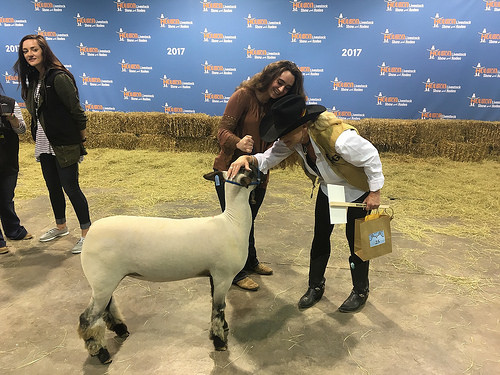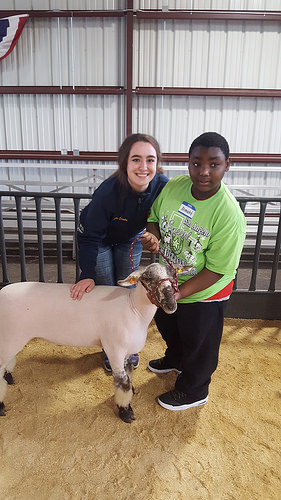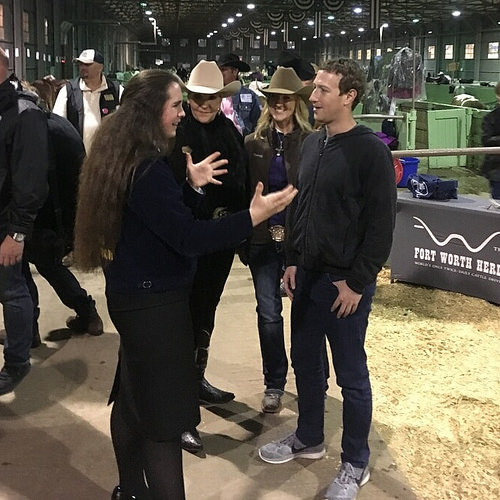Every month, USDA shares the story of a woman in agriculture who is leading the industry and helping other women succeed along the way. This month, we hear from Hanna Lisenbe, a high schooler from Texas with a passion for 4-H, FFA, Student Government, and Junior Student Council. Hanna exhibits lambs, goats, and swine and participated in the Texas 4-H Ambassador Program. She completed her ambassadorship by participating in the Livestock Ambassador Short Course, Advocacy Academy, Legislative session at the Capitol in Austin, and was selected to travel to Argentina and Uruguay for the Ambassador International Experience. Hanna was recently awarded the 2017 Houston Livestock Show and Rodeo Scholarship. After graduating from high school, she hopes to pursue a degree in Veterinary Medicine from Texas A&M University.
To learn more and connect with other women leaders in agriculture across the country, we encourage you to visit newfarmers.usda.gov/women-in-ag. If there is a leading woman in agriculture you’d like to see on the blog, please send us your suggestions at agwomenlead@usda.gov.
1. Can you tell us a little bit about yourself? How did you develop an interest and passion for 4-H?
I have always loved animals; growing up with my mother, a high school basketball coach, we moved around quite a bit, but my grandparents farm was a constant place of refuge for me and the place where I first developed a love for everything agriculture. My grandparents raised running quarter horses and had a small herd of Angus cattle and as a little kid I loved nothing more than to go help grandpa feed the cows, or grandma clean stalls. It sounds crazy, a little girl that had rather be out in the dirt and dust of a barn than inside playing with dolls and tea-sets but that was me; that old barn on my grandparents place is where my passion was first ignited. My mother had also been involved in 4-H and FFA throughout her youth, and with all the great experiences she spoke of I knew as soon as I was old enough I wanted to follow in her footsteps. So when third grade rolled around I was ready to pick out my first livestock projects, three medium wool sheep. From the day I brought them home and started working I was hooked and the journey of a lifetime had begun.
2. What does a typical day look like when exhibiting lambs, goats and swine?
I think any stock show kid would tell you the typical day of anyone who exhibits animals is a little crazy, but I think it truly takes a little crazy to achieve anything great. For me it would always begin with an early morning usually waking up at 4 a.m. to separate and feed all the animals and clean waters. Next would be school, practice and work, and following all that I would head to the barn again. The evening was always more extensive for me; this is when I did groundwork, halter breaking animals, preparing them for show, working leg wool or hair, and making sure everything was perfect so come show day we walked to the ring ready. I also exercised all the animals every day, with the treadmill being my favorite method of choice, and finishing up again feeding everything and cleaning waters. It definitely was a lot of hard work but every hour was worth it. It was time my family and I got to spend together and the hours at my own barn reminded me of my childhood at my grandparents. In all I probably spent over 5 hours at the barn every day and finding time for everything else in my life was difficult, however, I would trade any of it for the world, it shaped who am today, and as a high school who is done with showing it has been really hard to let it all go.
3. You are heavily involved in many organizations, how do you balance your extracurricular activities with schoolwork?
Balancing everything in my life has been one the most difficult things to face, especially this school year. My senior year, everything has seemed to pile up, and through it all I have definitely gained some great time management skills to say the least. I have personally learned what is most important to me and how to prioritize everything I do based on that premise. Animals always came first, before school, before food, before everything because unlike other things they can’t take care of themselves, they rely solely on you, so I always made sure they were my number one. After that I focused on school work, with seven AP classes homework often forces me to pull all-nighters, but the work always gets done. Next for me is my job, as an employee hired to do a job, I pride myself in doing it to the best of my abilities, and finally family time and fun, you have to have a little bit of a break between all the hecticness sometimes and there is no better people to enjoy quality time with than family.
4. From your leadership experience and witnessing others’ styles, how would you describe an ideal leader and prioritize their responsibilities?
In my opinion an ideal leader is a servant leader, the desire to serve others rather than yourself is at the basis of any great leader’s success, and it always helps the success of the group too. Of course there are other qualities that mark a great leader including, communication skills, expressing your ideas and inspiring others, understanding how to delegate and knowing when you need help in achieving a goal, and recognizing other’s talents and allowing them to shine are also keys to becoming an ideal leader. These ideas of putting others first and working together have been a part the agriculture industry (where I learned my leadership philosophy) since the beginning, feeding and clothing the world around us has always been the basis for what we do.
5. What lessons did you learn and/or skills did you develop through the completion of the Texas 4-H Ambassador Program and travel to South America?
Traveling to South America, through the Texas 4-H Ambassador Program was the first time I had ever been out of the country, and it was an eye-opening experience for me. From the La Rosa ranch in rural Uruguay, to Buenos Aires in Argentina, each day was a new experience of culture and agriculture. Over the trip, I grew more confident in my own skills and learned new ways to advocate for agriculture, which is something that I have been able to bring back to my daily life in Texas. I gained a new awareness and appreciation for the interdependent nature of agriculture systems worldwide and for the problems in international agriculture and sustainability of alternative solutions. The trip gave me a new and different perspective of the world, and the ability to share that new knowledge with those around me. Simply put, it fueled the passion I already had for this industry.
6. Who are your role models?
My family is very important to me; they have encouraged me through good times and supported me through bad. My family has shaped who I am today and has always been there for me. Out of all of my family members there is one person I particularly look up to beyond all the rest, Shannon Lisenbe, better known as Mom. I know it is the typical answer, however my mom is anything but typical, she is extraordinary; and I can’t think one person who has made and continues to make such a huge impact on my life. My mom has been by my side since the day I was born, she has supported me through numerous activities including everything from late night basketball games to early morning livestock shows. Her abilities to positively communicate, lead confidently, and persevere through any hardship are inspiring to not only me, but to everyone who has ever had the privilege to be acquainted with her. It is also these qualities that make her a great mother, a priceless friend, an invaluable worker, and most importantly, the perfect role model. Only Mom would help me carry my show box all the way across the Houston Livestock Show parking lot to the opposite end of the barn because I loaded it in the wrong vehicle. Only Mom would tell me how terrible I looked practicing showmanship so come show day I could be more prepared and practiced than any other kid in the ring. Only Mom could genuinely teach me how agriculture and showing isn’t about the buckles, banners, or paydays, it’s about the pool of knowledge and experience you can gain from being not a winner or a loser, but a simple participant.
7. Where do you see yourself in five, ten and twenty years and how do you hope to get there?
In five years, I see myself at Texas A&M Vet School specializing in genetics and breeding. I hope to have at that time started my own non-profit organization called Cultivating Kids that I have begun working on now, it will provide young refugee children, moving to America, assistance in getting involved in agriculture, specifically showing. In ten years, I hope to have already started my own specialty practice and have the opportunity to begin giving back to my community, I would love to represent agriculture and my area as a state representative by this point in my life. In twenty years, I hope to be successful, happy and still heavily involved in the agriculture industry, my dream by that time in my life would be to have the honor to be Texas Ag Commissioner, or something along those lines, despite being 18 I don’t have everything completely figured out just yet.
8. What advice do you have for young women interested in agriculture? Or what’s the best bit of advice you’ve gotten from someone?
Get Inspired! There are so many aspects of this industry and there is a place for everyone. Never allow anyone to squash your dreams, be positive, keep your head up and eyes on the end goal, whatever it may be for you. In the end it’s not always all about winning buckles or making a profit, it is about who we help and how we give back. The greatest experiences I have had in the agriculture have been giving back to my community, whether it’s been seeing smiles on younger kids faces and they learn where their food is from or seeing a kid I mentored come out of the show ring with a blue ribbon, that what I have enjoyed most. So the best advice I can provide is to find what you love and make a difference while doing it.



